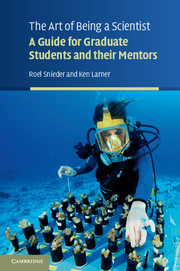Book contents
- Frontmatter
- Contents
- 1 Introduction
- 2 What is science?
- 3 Choices, choices, choices
- 4 The adviser and thesis committee
- 5 Questions drive research
- 6 Giving direction to our work
- 7 Turning challenges into opportunities
- 8 Ethics of research
- 9 Using the scientific literature
- 10 Communication
- 11 Publishing a paper
- 12 Time management
- 13 Writing proposals
- 14 The scientific career
- 15 Applying for a job
- 16 Concluding remarks
- Appendix A Further reading
- Appendix B A sample curriculum
- Appendix C The Refer and BibTeX format
- References
- About the authors
- Index
12 - Time management
Published online by Cambridge University Press: 05 June 2014
- Frontmatter
- Contents
- 1 Introduction
- 2 What is science?
- 3 Choices, choices, choices
- 4 The adviser and thesis committee
- 5 Questions drive research
- 6 Giving direction to our work
- 7 Turning challenges into opportunities
- 8 Ethics of research
- 9 Using the scientific literature
- 10 Communication
- 11 Publishing a paper
- 12 Time management
- 13 Writing proposals
- 14 The scientific career
- 15 Applying for a job
- 16 Concluding remarks
- Appendix A Further reading
- Appendix B A sample curriculum
- Appendix C The Refer and BibTeX format
- References
- About the authors
- Index
Summary
Time is all you have. And you may find one day that you have less than you think.
Pausch, 2008“I just don't have enough time to do all that I need to do.” This complaint has become almost the mantra of life in modern society. The fretting expressed here invariably leads to a state of physical and emotional stress that is often detrimental to the well-being of both our professional and personal lives. Key words in the mantra are [not] enough time, need, and just. The problem is not that there is not enough time – the time allotted to any individual in life is fixed (but unknown in advance). Therefore, most truly, we each have just the right amount of time for whatever it is that we choose to do in our lives. Rather than there not being enough time for all that we need to do, the problem is that we want to do too many things in a given amount of time. It's a matter of choice. The word just in the mantra suggests that we have no choice in the matter. The key message in this chapter, however, is that we do have that choice.
SETTING PRIORITIES
This brings us to the central point of time management. Given the finite amount of time available, we have essentially two ways to reduce the feeling of having insufficient time – by choosing our activities carefully and by working efficiently.
- Type
- Chapter
- Information
- The Art of Being a ScientistA Guide for Graduate Students and their Mentors, pp. 186 - 195Publisher: Cambridge University PressPrint publication year: 2009



